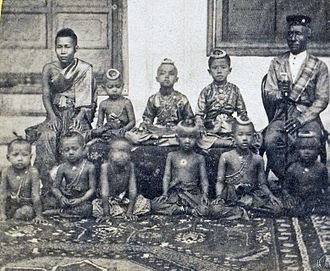May 7, 2021
Et cetera, et cetera, et cetera.
The King and I, by the team of Rodgers and Hammerstein, is based on Margaret Landon’s novel, Anna and the King of Siam (1944), which is in turn derived from the memoirs of Anna Leonowens, governess to the children of King Mongkut of Siam in the early 1860s. The musical’s plot relates the experiences of Anna, a British schoolteacher who is hired as part of the King’s drive to modernize his country. The relationship between the King and Anna is marked by conflict through much of the piece, as well as by a love to which neither can admit.
 |
King Mongkut (far right) with his heir Chulalongkorn seated next to him and some of his other children. A wife is seated at left. |
They initially sought Rex Harrison to play the part of the King, a role he had played in the 1946 film made from Landon's book, but he was unavailable. They settled on a young actor and television director, Yul Brynner, who came to dominate his role and the musical.
 |
| Yul Brynner in the original production of The King and I. |
The King and I premiered on Broadway’s St. James Theater on March 29, 1951. The last of the production’s 1,246 performances was on March 20, 1954. The run was, at the time, the fourth longest ever for a Broadway musical.
In early 1976, Brynner received an offer to star in the role that he had created 25 years before, in a U.S. national tour and Broadway revival. On opening night, Brynner suffered so badly from laryngitis that he lip-synched, with his son Rock singing and speaking the role from the orchestra pit.
On September 13, 1983, in Los Angeles, Brynner celebrated his 4,000th performance as the King; on the same day he was privately diagnosed with inoperable lung cancer. The last performance was a special Sunday night show, on June 30, 1985, in honor of Brynner and his 4,625th performance of the role. Brynner died less than four months later, on October 10, 1985.
Let’s play some clips. One of the most famous scenes is where the King tells Anna no one’s head is allowed to be higher than the King’s, and we hear the trademark line with which this blog began.
“I Whistle a Happy Tune” is sung by Anna to her son, Louis, after the curtain rises on Act One of the musical, to persuade him not to be afraid as they arrive in Siam to serve the King.
Anna sings “Hello, Young Lovers,” when she tells the wives of the King about her late husband, and sympathizes with the plight of Tuptim, the Burmese slave girl and newest wife of the king.
“Something Wonderful” is sung by Lady Thiang, the King’s number one wife, to Anna to persuade her to accept the King for what he is, despite his faults.
Lastly for this blog, “Shall We Dance,” from the 1996 Tony Awards with Lou Diamond Philips as the King and Donna Murphy as Anna. The moment when the King puts his hand on Anna’s waist is the moment when the pair realize there is love in their relationship.
Star Trek fans will recognize Donna Murphy, who starred in the roll from 1996-1997. Murphy played Anij in Star Trek: Insurrection.
👉 One more musical piece. QB 133 featured “West Side Story,” one of my all-time favorites. You may have heard that some 60 years after the original movie production, Steven Spielberg is directing a new version of this timeless classic. I found this clip, it’s 10 minutes long, but worth the time to watch it, comparing the actors in the original to the new cast.
👉 Here are a couple of phrase origins:
👉 And a couple to grin or groan on:
👉 Our correspondents from Victoria, BC sent me this great video. It explains why, if you are thinking about buying a retirement Ferrari, you might want to rethink that decision.
👉 Today’s close is from Praying with the Psalms, by Eugene H. Peterson.
“Sacrifice and offering you do not desire, but you have given me an open ear” (Psalm 40:6).
People of faith are not robots, computer programmed to go through religious motions. They are characterized as having “open ears” – as sensitive creatures who listen and respond to the Word of God.
Prayer: Lord, I want to learn to read your scriptures in a personal way: so that they are words written not about others but to me, and the result is not information crammed into my head, but behavior animated by faith. Amen.
-30-







No comments:
Post a Comment